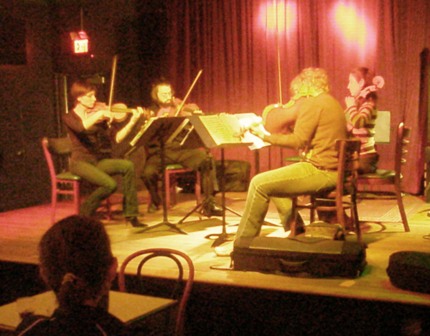
The Revolution Quartet. L to R: Tatiana Berman, Nick Naegele, Joanne Wojtowicz, Kaylie Eriksen
|
Sunday evening’s performance (Oct. 23), presented in collaboration with the Constella Festival of Music and Fine Arts, was typically innovative, with music for saxophone quartet, brass quintet, string quartet, clarinet and cello duo and solo works for violin by Johann Sebastian Bach. It marked the debut of the Elysium Saxophone Quartet, Jonathan Brink, Becky Morris, Carly Hood and Neal Postma (all students or graduates of the University of Cincinnati College-Conservatory of Music). It even boasted a world premiere, “Ancient Machines” for saxophone quartet by Matthew Browne (a composition graduate student at the University of Michigan).
Violinist Tatiana Berman, founder/artistic director of Constella, has been participating in Classical Revolution since the founding of the Cincinnati chapter two years ago. She performed again Sunday evening, both as a soloist and a member of the Revolution String Quartet. The concert – CR prefers to call them “happenings” – took place on a small stage in the back room of the Tavern (the musicians are as likely to perform in the front room, a more intimate, up-close environment, but there are fewer seats there). Director/clarinetist Laura Sabo provided the introductions, and the musicians offered comments on the music. The audience, which grew as the evening progressed and included “drop-ins” as well as people there to hear the performance, sat at tables as well as the bar, and the sound of billiards could sometimes be heard from an adjacent room.
Violinist Nick Naegele, a member of the Dayton Philharmonic Orchestra, opened with a fine, cleanly enunciated performance of the Sonata for Violin, No. 1 in G Minor, BWV 1001. The stage took on a literally golden glow with the Elysium Quartet, who opened their set with the Quartet for Saxophone (1987) by New York composer Elliot Del Borgo. It was a muscular performance, neither tonal nor atonal, that incorporated fugue, jazz rhythms and a melancholy slow movement.
Browne’s “Ancient Machines” (2010) was inspired by the act of creation and the motive behind it, he said. The first movement, “Perillos and Phalaris” illustrated the desire to exert “control over the masses,” specifically through the use of “war machines and torture devices.” The second, “Su Song’s Cosmic Engine,” represented the desire “to understand the unknown aspects of our universe.”
Needless to say, the music of the first, representing an unspeakable instrument of torture from ancient Sicily, grew agonized and came to a sudden end. The second, suggested by an astronomical invention from 11th-century China, evoked the cosmos, with ticking sounds and a big melody by the baritone sax. The Quartet closed with “Fault Lines” (1998) by Perry Goldstein, an upbeat work that seemed to combine pointillism with jazz a la Leonard Bernstein.
Sabo and cellist Kaylie Eriksen opened the second set with Nocturne for Clarinet and Cello (2001) by Akron native Orianna Web. Webb had the Armenian duduk (an ancient double-reed instrument) in mind when she wrote it, said Sabo, which gave it a gentler, more exotic sound.
Taking over from them was the Ohio Valley Brass Quintet, trumpeters Audrey Schmid and Barret Newman, French hornist Jenna McBride, trombonist Alex Manley and bass trombonist Sean McGhee. All are students at CCM and CR “regulars.” From Four Spanish Dances by Joaquin Nin-Culnell (arranged by trombonist McGhee) to the theme from the 1944 film noir “Laura” (by David Raksin), they treated their listeners to a wide variety of music. There were Voluntaries by English Renaissance composer Thomas Tallis, Debussy’s Prelude La puerta del Vino (originally for piano) and Kol Nidrei by Max Bruch (originally for cello and orchestra), all arranged by William Schmid. Only Kol Nidrei sounded lost in translation. Traditionally sung on Yom Kippur and scored for cello and orchestra by Bruch, it too fast, lacked subtlety and at times sounded more like a march than a sacred song.
Berman
opened the third set with the Allemande and Double from Bach’s Partita No. 1 in B Minor, BWV 1002. It was an agile
performance, marked by pure tone and clear, pointed articulation. She joined Naegele, violist Joanne Wojtowicz
and cellist Eriksen in selections for string quartet, including Brahms’ Hungarian Dance No. 5
and Andante from Mozart's Divertimento No. 1 in D Major, K.136. When the
writer left, they were still playing -- “into the night,” as Classical
Revolution would put it -- with the audience only just beginning to diminish.
Classical Revolution Cincinnati -- guaranteed to be an unforgettable, one-of-kind experience -- takes place the second Sunday of each month at 8 p.m. at Northside Tavern, 4163 Hamilton Ave. Admission is free (donations accepted).
For more about Classical Revolution, see www.classicalrevolution.org , their page on Facebook and on this site at:
http://www.musicincincinnati.com/site/news_2009/Classical_Revolution.html